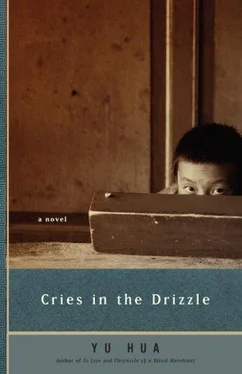Hearing an answer in the affirmative, the alcoholic elaborated with relish. “Fenfen's thighs were as smooth as flour.”
The pale-faced woman had to put up with this kind of thing practically every day, and after protracted exposure to such prattle she developed delusions, becoming convinced that the alcoholic and the blind man were conspiring to do her an injury. When Lulu first arrived, she nervously called him over and pointed at the two men in the next room, whispering, “They want to rape me.”
She would go to the hospital every morning, hoping that the doctors would be able to identify her illness so that she could be admitted to the hospital for treatment and escape the violation that was being plotted. But every day she would return despondently to the shelter.
Lulu spent a whole week in this company. Every morning he would go off to school with his satchel on his back, and return at the end of the day all black and blue and caked with dust. His injuries were contracted not from defending his imaginary brother, but because he was standing up for his very much alive mother. He had already decided what he wanted to do, but he did not share his plan with anyone else. In the shelter he learned the location of Seven Bridges by briskly quizzing the woman and the alcoholic. Early one morning he quietly rolled up his sleeping mat, tied it with a piece of string, and hung it on his back, then picked up his satchel and Feng Yuqing's big duffel bag and headed off for the bus station. He was full of confidence about his itinerary. He knew how much the ticket would cost and he knew there was no stop at Seven Bridges. To purchase the ticket, he handed over the five-yuan note that his mother had given him, and then, tightly clutching the remaining three yuan and fifty cents, walked over to a little shop next to the station, intending to buy a Front Gate cigarette to bribe the driver. What he found out was that it cost two cents to buy one cigarette, and only three cents to buy two. My little friend stood there in a quandary. In the end he decided to take out three cents and buy two cigarettes.
That morning on the verge of summer, Lulu sat in the bus heading toward Seven Bridges, holding in his left hand the remaining money, wrapped in a handkerchief, while his right hand gripped the two cigarettes. It was the first time he had ever been on a bus, but he was not in the least thrilled by the novelty of this experience and gazed solemnly out the window. At frequent intervals he checked with the middle-aged woman sitting next to him how far it was to Seven Bridges. Later, when he learned that Seven Bridges was just ahead, he left his seat and moved the duffel bag and bedroll to the doorway. Then he turned to the driver, passed him a cigarette now soaked with perspiration, and pleaded, “Uncle, could you please let me off at Seven Bridges?”
The driver took Lulu's gift, glanced at it, and then tossed the sodden cigarette out the window. Lulu noted the driver's disdainful expression and bowed his head in vexation. He now planned on walking back from the stop following Seven Bridges. But, as it turned out, the driver did stop the bus and let him off at Seven Bridges. It was almost midday now, and Lulu could see a high wall not far away, the barbed-wire netting on top confirming that this was indeed the labor camp. With the bedroll on his back, carrying a duffel bag that was practically his own size, he set off under a blazing sun.
When he got to the front gate, he saw an armed soldier on guard there. As he walked up to him, he eyed the cigarette in his hand. Mindful of how the driver had thrown his out the window, he dared not try the same thing with this cigarette, so he just smiled bashfully at the young guard and said, “I'm going to stay with my mom.” Pointing at the bedroll and the duffel bag, he said, “I brought all our stuff.”
It was afternoon by the time Lulu saw his mother. The guard had passed him on to someone else who delivered him eventually to a man with a beard. The bearded man led him to a small room.
That is how Feng Yuqing, dressed in her black prison uniform, saw her battle-scarred son. The realization that her little boy had made his way to see her all by himself brought tears to her eyes.
Despite the rigors of the journey, Lulu, far from being tearful, told her excitedly, “I've quit school. I'm going to study on my own.”
Feng Yuqing buried her face in her hands and wept, and this made Lulu cry too. Their meeting was very brief, and within a short time a man came to take her away. Lulu hurriedly picked up the bedroll and the duffel bag, planning to go with his mother. When he found his advance blocked, he cried sharply, “What's wrong?”
The man told him he had to leave. He shook his head emphatically, saying, “No, I'm staying. I want to be with my mom.” He cried to her, “Tell him I'm not leaving!”
But when she turned around, it was to tell him he could not stay. He dissolved into a flood of bitter tears, and he wailed to his mother, “I brought the bedroll too, so that I can sleep under your bed. I won't take up any room!”
In the days that followed Lulu began living an outdoor life. He laid the bedroll out underneath a camphor tree, used the duffel bag as a pillow, and lay there reading his textbooks. If hungry, he would take the money his mother left him and go to the snack shop nearby to have something to eat. Always on the alert, as soon as he heard the thud of well-regulated footsteps he would drop his book and sit up, opening his dark eyes wide. When a line of black-garbed prisoners trotted past, hoes on their shoulders, a head would turn to look at him and Lulu s rapturous gaze would meet his mothers eyes.
It's been said that my grandfather Sun Youyuan was a man in a rage, but you need to bear in mind that it was my father who said that. Sun Kwangtsai was a father skilled in evading responsibility and fond of imposing crude discipline, and when a patchwork of welts began to appear on my skin and he was panting from the effort of laying into me, he would invoke the memory of my grandfather, saying, “If it were my dad, he would have beaten the life out of you ages ago.”
My grandfather had passed away by then, and my father (like other people at the time) was in the habit of sticking tyrant or other such fearful epithets on the tombstones of the dead, while projecting himself as civilized and cultivated. My father's words must have had a certain effect, for when the pain wore off I could not help feeling some gratitude to him. What he said, after all, indicated that he did place some value on my life.
After I reached adulthood and began to create in my mind a more accurate image of my grandfather, I found it difficult to imagine him as a man in a rage. Perhaps my father was trying to console me by reminding me what hard lessons he had learned in his childhood, as though he were saying, “Compared with the beatings I used to receive when I was young, what you're getting doesn't count as much at all.” If I could have seen things in that light, then my self-esteem would have survived intact even if my body took a beating. But pain made me lose my wits, and apart from howling like a beast I could think of no other way to react.
In the old days it never ceased to surprise people that my grandfather showed such respect for the woman in his life, but this was his way of expressing — however unconsciously — his gratitude to destiny. My grandmother had been pampered and coddled as a child. At sixteen she was married off, riding a bridal sedan chair and wearing tiny embroidered shoes, but within two years she was forced to leave that grand mansion, slumped drowsily on the back of a pauper. My destitute grandfather led her to a Southgate overgrown with weeds. Her dazzling heritage so overshadowed Sun Youyuan as to make his own life seem dismal and gloomy by comparison.
Читать дальше












